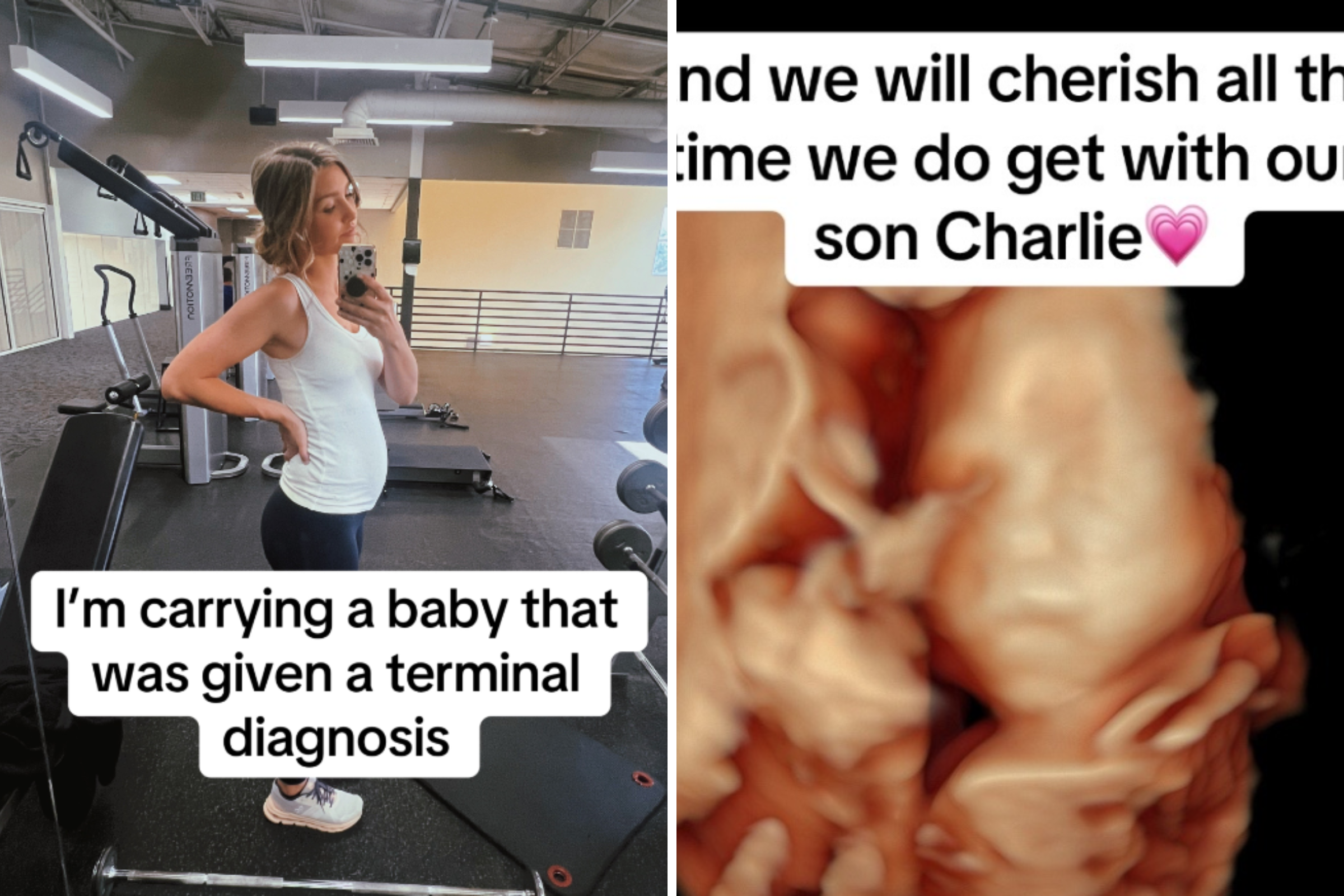A mother’s world came crashing down after she learned that her unborn son, Charlie, has a rare terminal illness.
Madysen Wilcox, from Utah, first learned something might be wrong during a routine 15-week ultrasound after experiencing some complications early in her pregnancy.
Although her subchronic hematoma—a small collection of blood between the fetal membranes and the uterine wall—wasn’t threatening to her pregnancy, it led to spotting, which prompted her midwife to request an ultrasound.
@mamafitmadz
“They noticed my baby’s side profile looked a little off (they could not locate a nasal bone) and his brain wasn’t as developed as it should have been at that point,” the 29-year-old told Newsweek.
Doctors initially suspected Down syndrome but a genetic blood test came back negative. Despite this, Wilcox’s midwife sought a second opinion from a specialist, leading to the follow-up scan three weeks later.
This was when Wilcox’s world turned upside down. Her son was diagnosed with alobar holoprosencephaly, a rare and terminal brain defect in which the two hemispheres of the brain fail to form and divide.
“Looking back on the day when we got the diagnosis, it felt like my soul left my body and I was watching myself react to the news,” Wilcox told Newsweek.
After an agonizing few minutes of silence, Wilcox’s husband, Darin, asked how things were looking. “I’ll never forget the words that came out of her mouth, ‘I’m concerned,’ and I just remember my heart sinking to my stomach,” she said.
A doctor confirmed the news and Wilcox attempted to make it to the sink for fear of vomiting but her legs buckled beneath her and she collapsed to the ground.
“My whole world felt like it was crashing down and I was suffocating. It was all hitting me that we had just been told our baby will not survive. It was the last thing I ever expected to hear,” she said.
The condition is so rare that doctors have little insight about how long Charlie might survive, and there is a significant risk that he could be stillborn.
Wilcox, who has two other children, shared her story in a video on TikTok, which has since received 166,000 views and hundreds of comments. She captioned the clip: “This isn’t the end.”
TikTok users mostly commented that they were sending prayers to Wilcox and her family, while others shared similar stories to the Utah mom.
“My son was diagnosed with a lethal condition at our 20 weeks scan at the end of June. We lost him at 24 weeks… hang in there,” one user wrote.
Despite the heartbreak, some social media users shared glimmers of hope in the comments section too.
“My baby has hydrocephalus, they told me he wouldn’t make it… we prayed and let God take her in his own time. She is now 4 years old and drs [doctors] are shocked,” another commented.
Newsweek spoke to Dympna Weil, MD and board certified OB/GYN about Wilcox’s case who explained that while the 18-20-week scan is a time for expectant parents to get excited about the gender of their baby, it’s also an opportunity to inspect the anatomy of the growing fetus in case something is awry.
She described how it’s one of “the hardest situations” in her job when there is an unexpected finding on an obstetrical ultrasound.
“With alobar holoprosencephaly, there are severe facial deformities, sometimes including a single eye in the middle of the face (cyclopia) or perhaps a missing eye, the presence of a proboscis, a tubular shaped nose, very small eyeballs, or occasionally closely spaced eyes with [a] flattened nose,” Weil told Newsweek.
Holoprosencephaly is the most common forebrain malformation for humans, but most of the 1/250 affected pregnancies end in miscarriage during the first trimester, she explained.
“On the other hand, it is rather unusual for a pregnancy to continue to a live birth with the diagnosis of holoprosencephaly, which has a prevalence of about 1/16,000,” Weil said, highlighting the rarity of Wilcox’s situation given that she’s 18 weeks along in her pregnancy.
The life-changing news for Wilcox’s family has made her live life more intentionally. “I am more grateful for things I took for granted prior to Charlie’s diagnosis. I look at my other kids like they’re walking miracles because they’re so healthy,” she told Newsweek.
The 29-year-old also reflected on her previous pregnancies and was in disbelief about how fortunate her and Darin were to not question the fetal development process.
“I also recognize how bizarre it is to be part of such a small percentage of people worldwide who have gone through this process or have experienced this diagnosis.
“It has truly opened my eyes to a lot of things. This has strengthened my faith, it’s made me more compassionate and grateful,” she added.
